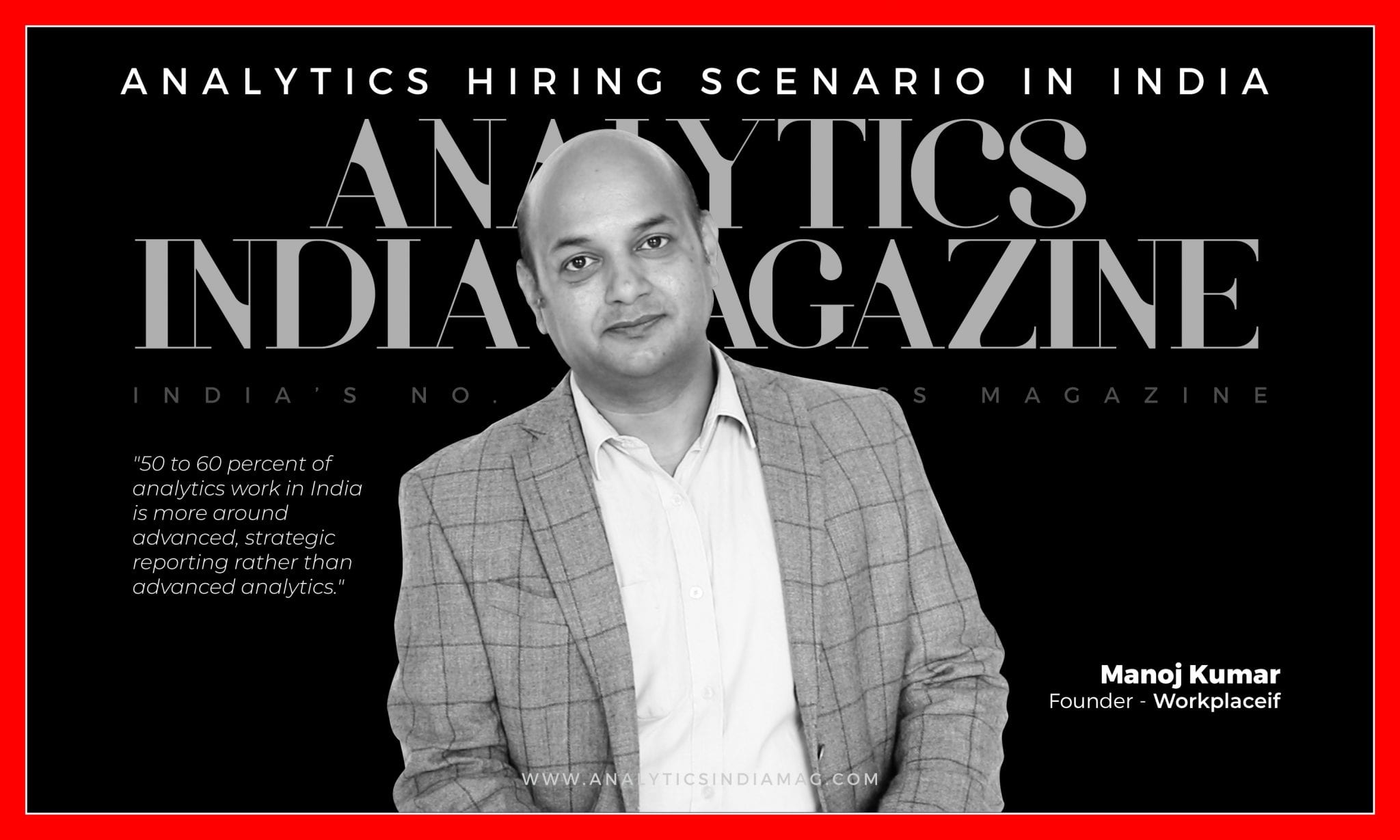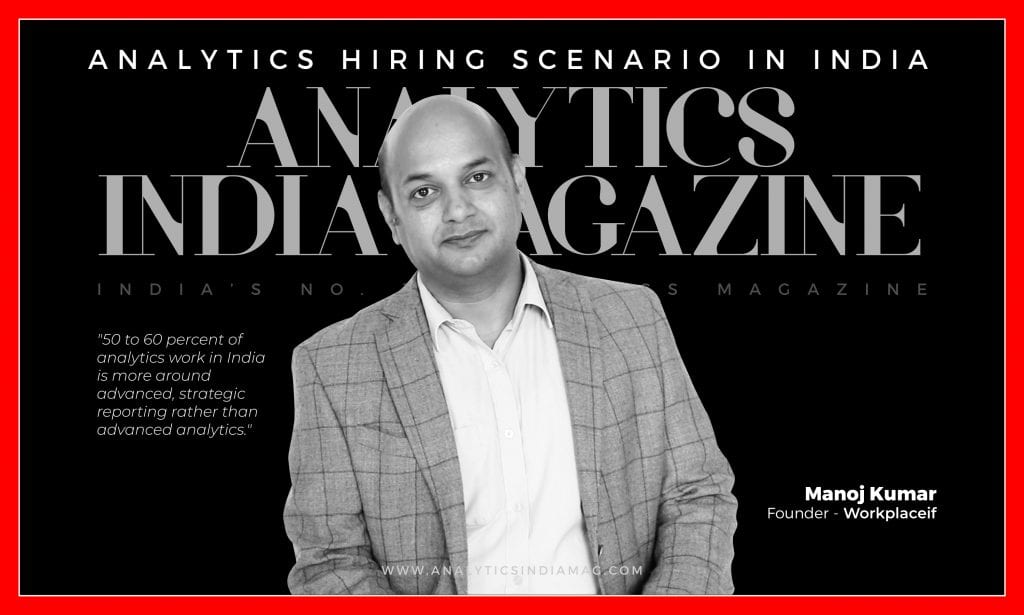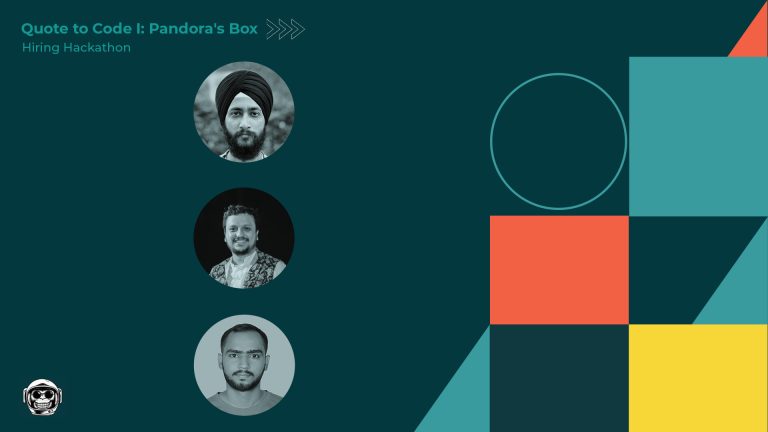As part of our theme Analytics Hiring Scenario, we converse with Manoj Kumar, Founder of Workplaceif, an HR analytics startup based in Bengaluru. Before Workplaceif, Kumar worked extensively in business analytics in various premier organisations such as HSBC, Fidelity Investments, Genpact and Tata Consultancy Services. He is also the winner of HR 40 Under40 award in 2017. A thought speaker and a blogger, Kumar is an advisor on future of Work, Workplace Digital Transformation and Workforce Analytics.
In this interview, Kumar shed light on how hiring is looked into the field of data analytics, and trends in this lucrative industry.
Analytics India Magazine: There is a lot of buzz about analytics, big data and AI around the industry. Do you think these are mere buzzwords or are we actually seeing an analytics revolution in the IT industry?
Manoj Kumar: To answer this question, let’s take a step back to understand what’s happening around us today. Humankind has experienced three Industrial revolutions so far – 1.0 was all about mechanical power, 2.0 was about electricity, and 3.0 was about information technology. Today we are undergoing a new transformation where physical, digital and biosphere boundaries are merging – an Industrial Revolution 4.0 which is size, geography, and industry agnostic. In the digitally transformed world, we leave data footprints for every action that we take, generating an abundance of data. On the other side, the sophistication of pattern recognition algorithms has gone multiple folds and available via cloud-based computing infrastructure at a much cheaper cost. This trend has led to a dynamic business eco-system where tech-based startups are becoming a threat to the well-established large organizations by offering more personalized and pointed value-added services to the customers.
If the outside change is faster than internal, survival of the organization is questionable. Hence, in this complex business situation, organizations are bound to take advantage of emerging technological advances like AI, ML, and Big data to remain relevant for the future. So, this is no more a buzz — it’s the reality.
AIM: Do you think Data Scientists are expensive and difficult to find?
MK: “Expensive” is a relative word when evaluated in the context of return from the investment. If a data scientist is employed to do the right job, delivering a high-impact outcome, I wouldn’t call it expansive. However, yes, if you hire a data scientist to do a job that can be done by business consulting profile.
Data Scientist has been in existence for quite long. Are they still challenging to find? The answer is yes because there is no commonly understood definition of a data scientist. In the absence of defined competency of a data-scientist, an abundance of profiles is tagged with the title, increasing the total population of data scientists and making recruiting conversion ratio tiny.
AIM: How does the analytics hiring scenario in Indian companies look like?
MK: Analytics industry offers multiple roles – strategic reporting, advanced analytics, visualisation, business consulting and so on. I would say that 50 to 60 percent of the analytics work in India is around advanced and strategic reporting than advanced analytics. So, still, the absolute number of AA hiring may not look large. However, it’s picking up very fast. Another vital role that is surfacing is an Analytics Translator role – a person who understands business and analytics both, and can tell decision-science based narrative in English that makes sense to the business. I call “translator” as one of the most critical roles in Analytics.
AIM: Do you think there is an imbalance between the available talent and required skill set in the analytics industry?
MK: Yes, globally and local both. Today, most of the organisations are looking for data-science talent but not found easily in the market. The industry is evolving from IT to digital and current trend requires different expertise. It’s evident that we have more IT talent than Data science. We need programs that can upskill/align the current abilities to future talent.
AIM: We see institutes advertising that their students get five or ten times their current salaries by switching to a career in analytics. Do you think that’s just an advertising gimmick or does industry appreciates the analytics talent more?
MK: Analytics talents are paid relatively well, and it has been in existence for long. It’s not something new today. However, Institutes have to be careful selling those dreams to students. They need to think about innovative ways of building analytics talent in the industry. Everyone can’t be a data scientist and should not be. Analytics industry requires all sorts of skills as explained earlier and they need to prepare talent for all not only data science.
AIM: What are the skill sets that companies are mostly looking at while hiring analytics talent?
MK: While hiring both – hard and soft skills are taken into consideration. However, the weight may vary depending on the role, industry, and the organisation. Hard skills may include large data management, finding a pattern, hard-core coding, statistics, visualisation while soft skills may consist of problem-solving, collaboration, and narrative building.
AIM: Do you think a postgraduate degree or a specialisation course provides an advantage for getting hired?
MK: It depends on the role. However, yes, postgraduates bring-in a lot of structured thinking and ability to connect multiple dimensions of the business. Analytics is all about solving unstructured business problems in a structured manner. The PG or specialised courses equip talent to appreciate business context, manage stakeholders, build the right narrative, and re-deployable frameworks.
AIM: What are the various initiatives that companies and educational institutions can take to set right the analytics talent flow?
MK: Refer to industry employment reports, and you will learn that many organisations are not able to find the right talent for the analytics roles. It demonstrates a gap between curriculum being taught at institutions versus what sort of talent corporates need. Many initiatives are already at play. One such initiative is a collaboration between industry and academia. Academicians need to align their curriculum to what industry is want. On the other side, enterprises should start taking active participation in building talent by delivering courses at the institutes or via online channels.
AIM: What are the three must-have skills that you look for while hiring a candidate?
MK: I give more credit to soft skills, learnability, adaptability and solving unstructured problems in a structured way. When I say learnability, it means the ability to learn new skills to match to industry practices. Adaptability is more about understanding the culture, adopting new ways of working, and collaborating with others to deliver an effective outcome.
AIM: What would you advise freshers who are looking to start a career in analytics?
MK: Analytics is not about data science only. There are many more roles that you may aspire to opt. It is essential to understand your strength and interest, and if possible align them. Initial few years of your career should be devoted to trying different things before you nail down to one area where you want to build your specialisation.
AIM: What is your advice to experienced professionals, who are now looking to transition into analytics.
MK: Stop thinking if Analytics career is achievable or not. I have seen people becoming successful analytics professional coming from IT, business, and non-stats background. Take the first step and start your journey. There are many resources available for you to test the appetite for the different roles.
AIM: Would you like to share any interesting experience you have had during interviewing an Analytics Professional?
MK: We had a candidate for a BI role, who was aspiring to transition from IT to Analytics. He wasn’t sure if he would fit in analytics due to no statistics knowledge. I too wasn’t sure about his long-term career path, but we decided to figure out as we go. Fast forward, he is an M/L talent today. He used his IT skills to develop himself into an ability which is most in demand today. On this journey, he unlearned many things and learned new skills. I think that was the key to his success.
Most of the time, we don’t take the first step forward assuming that it will not happen. Today, organisations like those talent most, who bring learning ability, adaptability, and right behaviour on the table. Hard skills are trainable.




















































































